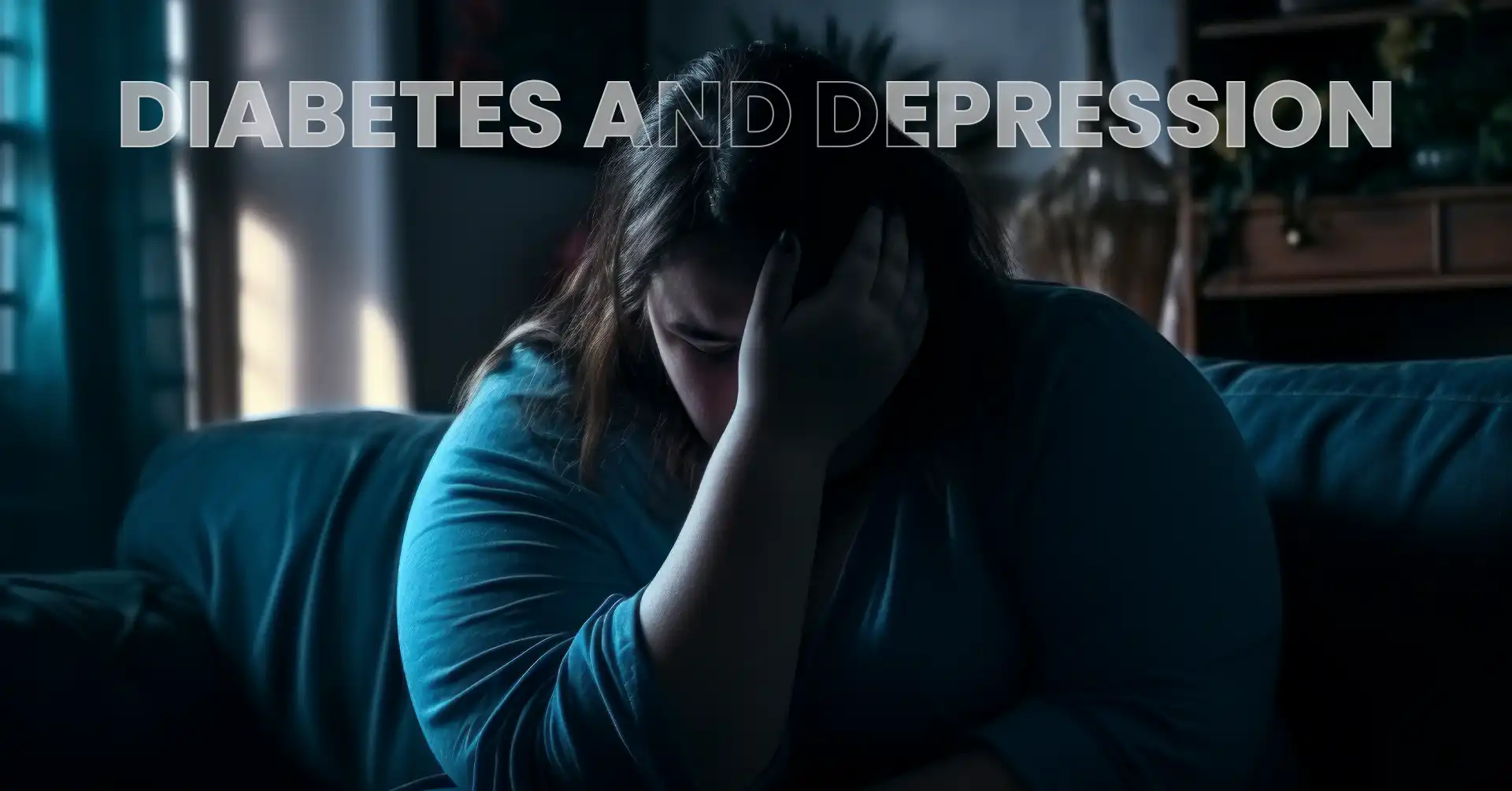Hello, my wonderful readers! In exploring the intricate relationship between diabetes and depression, one uncovers a compelling chemical correlation that intertwines these seemingly disparate conditions. Diabetes, a chronic metabolic disorder characterized by high blood sugar levels, and depression, a pervasive mental health condition marked by persistent feelings of sadness and loss of interest, share more than just symptomatic parallels. Recent research has shed light on the underlying biochemical connections that link these conditions, revealing a complex interplay of hormones, neurotransmitters, and inflammatory markers within the body. Understanding this intricate chemistry is crucial, as it not only provides insight into the co-occurrence of diabetes and depression but also offers potential avenues for integrated treatment approaches.
Individuals living with these conditions and healthcare professionals can better appreciate the nuanced interrelationship between physical and mental health by delving into the molecular mechanisms. This blog aims to dissect the chemical underpinnings of diabetes and depression, illuminating how these two seemingly distinct conditions are intrinsically connected at a biological level.
Why are Diabetes and Depression Chemically Correlated?
The intricate interplay between diabetes and depression extends beyond their surface symptoms, delving deep into the realm of biochemistry. Understanding the chemical correlation between these two conditions is crucial for comprehending their complex relationship and developing more effective treatment strategies.
Shared Neurotransmitter Dysfunction:
Diabetes and depression both involve alterations in neurotransmitter levels within the brain. Serotonin, dopamine, and norepinephrine, crucial neurotransmitters implicated in mood regulation, are commonly affected in individuals with depression. Similarly, studies have revealed disruptions in these neurotransmitter systems in diabetic patients, contributing to mood disturbances and depressive symptoms.
Hormonal Imbalance:
Hormonal dysregulation plays a pivotal role in the pathophysiology of both diabetes and depression. In diabetes, insufficient insulin production or impaired insulin sensitivity leads to abnormal blood glucose levels, disrupting hormonal balance throughout the body. This imbalance not only exacerbates diabetes-related complications but also influences mood-regulating hormones such as cortisol and thyroid hormones, contributing to depressive symptoms. Furthermore, chronic stress associated with diabetes can perpetuate hormonal imbalances, exacerbating both physical and psychological distress.
Inflammatory Pathways:
Chronic inflammation has emerged as a common underlying factor linking diabetes and depression. In diabetes, persistent hyperglycemia triggers an inflammatory response, characterized by elevated levels of pro-inflammatory cytokines such as interleukin-6 (IL-6) and tumor necrosis factor-alpha (TNF-α). This chronic low-grade inflammation not only contributes to insulin resistance and diabetic complications but also crosses the blood-brain barrier, eliciting neuroinflammatory changes associated with depressive symptoms. Moreover, depression itself is characterized by heightened inflammation, with studies demonstrating elevated levels of pro-inflammatory markers in individuals with depression. Thus, the shared inflammatory pathways contribute to the chemical correlation between diabetes and depression.C
Oxidative Stress:
Both diabetes and depression are associated with increased oxidative stress, resulting from an imbalance between reactive oxygen species (ROS) production and antioxidant defense mechanisms. In diabetes, prolonged hyperglycemia leads to the generation of ROS, causing oxidative damage to cells and tissues. This oxidative stress not only exacerbates insulin resistance but also contributes to neuronal damage and neurodegeneration, predisposing individuals to depression. Similarly, in depression, dysregulated oxidative stress pathways contribute to neuronal dysfunction and impairments in neuroplasticity, perpetuating depressive symptoms. Thus, the parallel increase in oxidative stress serves as another chemical link between diabetes and depression.
Shared Genetic Vulnerability:
Genetic predisposition plays a significant role in both diabetes and depression, with overlapping genetic susceptibility observed between the two conditions. Several genes implicated in glucose metabolism, insulin signaling, and neurotransmitter regulation have been identified as risk factors for both diabetes and depression. Additionally, epigenetic modifications induced by environmental factors can further exacerbate genetic predisposition, influencing the onset and progression of both conditions. This shared genetic vulnerability underscores the intertwined nature of diabetes and depression at a molecular level.
The chemical correlation between diabetes and depression is multifaceted, involving intricate interactions between neurotransmitter dysfunction, hormonal imbalance, inflammatory pathways, oxidative stress, and genetic predisposition. Recognizing these underlying biochemical mechanisms is crucial for developing holistic treatment approaches that address the physical and mental health aspects of these co-occurring conditions. By unraveling the intricate chemistry linking diabetes and depression, researchers and healthcare professionals can pave the way for more targeted interventions and improved outcomes for individuals affected by these chronic diseases.
How to Treat Such Cases?
Addressing the correlation between diabetes and depression demands comprehensive treatment strategies that target both the physical and mental aspects of these conditions. Active interventions are crucial to alleviate symptoms and improve overall well-being.
Integrated Care Approach:
Integrated care models bring together medical professionals from various disciplines to address both diabetes and depression simultaneously. This approach ensures coordinated treatment plans tailored to individual needs.
Lifestyle Modifications:
Engaging in regular exercise, maintaining a balanced diet, and getting sufficient sleep are fundamental lifestyle changes that benefit both diabetes and depression. Encouraging patients to adopt healthy habits can mitigate symptoms and improve overall health outcomes.
Medication Management:
Pharmacological interventions play a vital role in managing diabetes and depression. Antidepressants, combined with diabetes-specific medications, may be prescribed to address both conditions effectively. Close monitoring of medication adherence and potential interactions is essential.
Cognitive Behavioral Therapy (CBT):
CBT is a proven psychotherapeutic approach that helps individuals identify and modify negative thought patterns and behaviors. Integrating CBT into treatment plans can empower patients to manage stress, cope with emotions, and enhance self-care practices.
Support Groups and Peer Counseling:
Peer support groups provide a valuable platform for individuals facing diabetes and depression to connect with others who share similar experiences. Sharing insights, challenges, and successes in a supportive environment can foster resilience and promote emotional well-being.
Mindfulness and Relaxation Techniques:
Mindfulness-based interventions, such as meditation, yoga, and deep breathing exercises, offer effective strategies for managing stress and promoting emotional balance. Encouraging patients to incorporate these practices into their daily routines can enhance self-awareness and resilience.
Disease Education and Self-Management:
Educating patients about diabetes management techniques, including blood sugar monitoring, medication adherence, and dietary modifications, empowers them to take an active role in their care. Providing resources and support for self-management fosters confidence and improves treatment outcomes.
Regular Monitoring and Follow-Up:
Regular physical and mental health monitoring is essential for tracking progress and identifying potential complications. Scheduled follow-up appointments enable healthcare providers to adjust treatment plans as needed and provide ongoing support.
In addressing the complex correlation between diabetes and depression, a multifaceted approach to treatment is essential. By integrating medical, psychological, and lifestyle interventions, healthcare professionals can effectively manage symptoms, improve quality of life, and promote holistic well-being for individuals living with these interconnected conditions. Empowering patients to participate in their care and providing comprehensive support are essential to successful treatment strategies.
Conclusion
The chemical correlation between diabetes and depression underscores the intricate interplay between physical and mental health. Understanding the biochemical mechanisms linking these conditions is essential for developing effective treatment approaches. By acknowledging the shared pathways and biological markers involved, individuals living with diabetes and depression can receive more targeted interventions that address both aspects of their health. Moreover, healthcare professionals can tailor integrated care plans encompassing medical management, psychotherapeutic interventions, and lifestyle modifications to optimize outcomes. Empowering patients to engage actively in self-care practices and providing ongoing support are vital components of comprehensive treatment strategies. By recognizing and addressing the chemical correlation between diabetes and depression, society can strive towards a holistic approach to healthcare that prioritizes the well-being of individuals as a whole, recognizing the interconnected nature of their physical and mental health.
Also Read:
Natural Remedies for Depression: Get Rid of Depression Naturally






